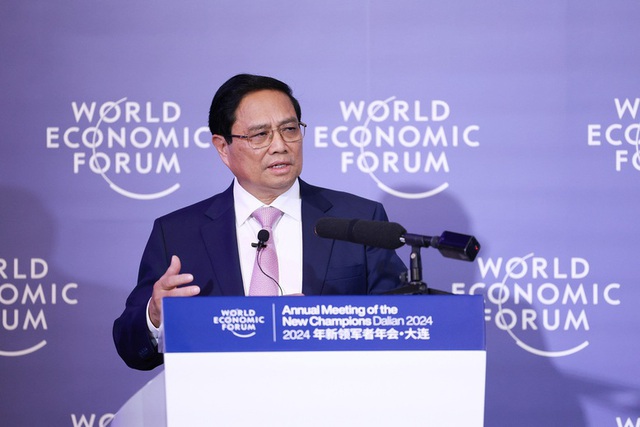Gov’t chief shares growth and FDI attraction priorities
VGP - Prime Minister Pham Minh Chinh stressed that Viet Nam prioritizes projects in digital economy, green economy, circular economy, sharing economy, and knowledge economy that are all a growing trend in the world.

Prime Minister Pham Minh Chinh at the working breakfast with World Economic Forum Chairman and founder Klaus Schwab and leading WEF corporations, Dalian, China, on June 26, 2024 - Photo: VGP/Nhat Bac
The Vietnamese Government chief stressed the point during a working breakfast with World Economic Forum Chairman and founder Klaus Schwab and leading WEF corporations in Dalian, China, on June 26.
A large number of delegates highly valued high economic growth, and the investment and business environment in Viet Nam, especially the digital economy that accounts for around 16 percent of the country's GDP.
Prof. Klaus Schwab said that WEF is delighted to enjoy close ties with Viet Nam, a bright rising star of the world economy.
Addressing the event, Prime Minister Pham said that Viet Nam will pursue its ongoing proactive, flexible, timely and effective monetary policy, continue to reduce taxes, and promote public investment.
The country targets to diversify markets, products, production chains, supply chains, effectively implementing free trade agreements, expanding new markets, and facilitating trade liberalization.
The country will continue to maintain macroeconomic stability, control inflation and debts within allowable limits, and ensure the major balances of the economy. It will focus on promoting three strategic breakthroughs in institutions, infrastructure, and human resources.
The Government chief took the occasion to urge foreign businesses to provide continued support for Viet Nam, and assured that the government will further improve the investment environment to support businesses operating effectively in the country.
The Vietnamese Government is expected to issue a decree to implement the global minimum tax and amending the investment incentive policy from mainly tax incentives to financial, cost, and land incentives for priority projects.
On this occasion, Mr. Pham briefed foreign investors about Viet Nam’s selective investment projects in emerging and high technology fields with high added value to support new growth drivers such as digital transformation, green transformation, semiconductors and artificial intelligence (AI).
He also reiterated Viet Nam’s effort in implementing its net zero commitment, especially its project to grow one million hectares of high-quality, low-emission rice in the Mekong Delta which is the first ever project in the world./.
